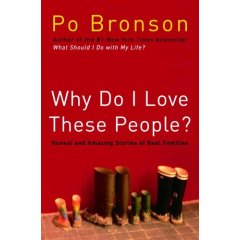Reviewed March 5, 2006.
Random House, New York,
2005. 381 pages.
Available at Sembach
Library
(MCN 306.85 BRO).
This book is
set up like Po
Bronson’s other excellent book, What Should I Do with My Life? As in that book, he poses several questions
and gives a possible answer with a story. This
book didn’t move me quite as much, probably because I
personally
don’t have as many questions about family as I do about finding one’s
calling.
I admit, I
liked the stories
where couples got through tough times, and stayed together and ended up
with a
stronger marriage than ever. Or the
couple that got divorced but found forgiveness and remarried each other. (That’s what I want to hear right now.) However, there were also stories where people
found happiness only after a divorce. The
author doesn’t just look at marriages, but also at
relationships
with one’s children and parents and siblings.
All in all,
this book gives a
picture of families in America
today. They are complicated, spread-out,
hard-working. Po Bronson says, right at
the start, “The big conclusion they offered, collectively, was
beautifully
simple: that no matter how hard it’s
been, we all can create a better family experience.
They made me want
to undertake whatever it
took to have a better family.”
Some of the
insights that
came up were profound, like this one: “Forgiving
your enemies is the easy part. The hard
work is in forgiving those you
trusted to care for you, those precious few you believed would keep
your
interests in mind, the one person you thought would never do that to
you. Forgiving those you love is not
something you
do once, like a ceremony. It’s required
of you, in some form, every single day.”
The author
says that working
on the book changed him. “What I hold in
my mind’s eye is no longer a naïve myth. By
studying actual families and sorting for the great
ones, I’ve
discovered they do not resemble the imaginary family that once resided
in my
mind’s eye. I’ve learned that painful
and troubling things happen, even in great families.
I’ve learned they still get in arguments and
they still get their feelings hurt, but over time they overcome most of
the
challenges in their path. They may not
be tolerant, but they eventually learn tolerance. They
may try to control one another, but they
eventually learn not to.”
He concludes,
“I hope what
these stories demonstrate is love. Not
fakey romantic love, and not love that’s perfect or anything close to
idealistic. Rather, how you get through
life
with the ones you love. This might lack
the sizzle of a grand theory, but it makes up for it with veracity. It might lack the comfort of a temporary
cure-all, but it makes up for it with integrity.”
Reviews of other books by Po Bronson:
What Should I Do With My Life?
NurtureShock
Top Dog
Copyright © 2006 Sondra Eklund. All
rights reserved.
-top of page-
 Book Reviews by Sondra Eklund
Book Reviews by Sondra Eklund
 Book Reviews by Sondra Eklund
Book Reviews by Sondra Eklund
